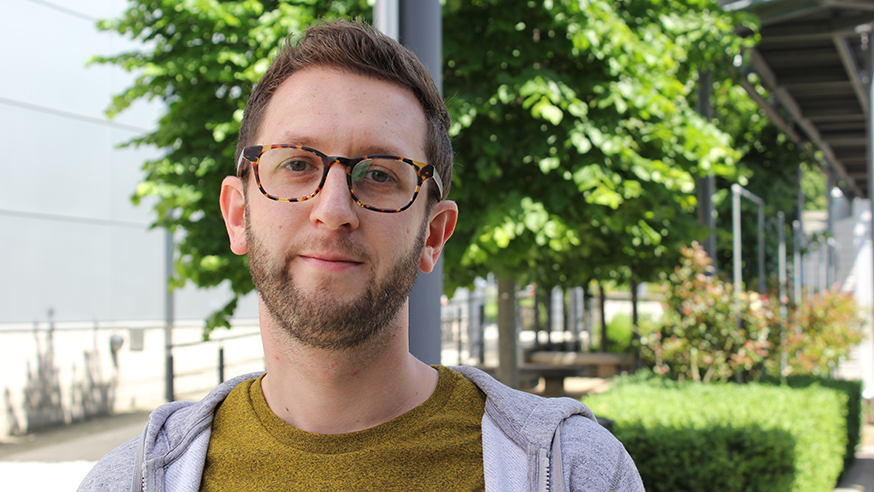
Jamie Dean, a PhD student at the ICR (photo: Steve Robinson/the ICR)
In October, I’ll be completing my PhD at The Institute of Cancer Research, London. Funded by the Engineering and Physical Sciences Research Council, my research is about predicting and reducing side-effects from radiotherapy for head and neck cancer.
I'm part of the Radiotherapy Physics Modelling Team in the Division of Radiotherapy and Imaging. My day usually starts with checking up on the latest published research studies, both within my own area of radiotherapy physics and further afield. I'm always on the lookout for new techniques in maths and physics that could be translated to solve problems in biology and medicine.
I work in biomedical science, but it’s much more than the stereotypical image of pipetting chemicals while sporting a white coat and goggles.
I spend most of my day in a ‘dry lab’ developing and evaluating computer models of radiotherapy side-effects using state-of-the-art machine learning and statistics. These are the same kind of techniques that tech companies use for artificial intelligence, such as Google’s self-driving cars.
By ‘feeding’ these models information from previously treated patients, they ‘learn’ how different aspects of the treatment relate to side-effects, and they use this understanding to predict what will happen to future patients.
'Communication is vital'
Predicting what side-effects individual patients might experience can improve personalisation of head and neck cancer treatments. The patterns between treatment and side-effects that are learnt by the models also inform how radiotherapy techniques could be improved in the future to reduce these side-effects.
I present my findings at conferences and publish them in scientific journals to share our research with the cancer research community around the world. I also peer-review work that other scientists submit to journals to assess it before publication.
Communication is a vital part of science, particularly the kind of multidisciplinary team science needed to address the complex problems that we face in cancer research. My challenge is presenting advanced maths and physics techniques to biologists and doctors, many of whom haven't studied these subjects since they were 16 years old.
The ICR is a hub for sharing ideas and there are numerous lunchtime seminars by ICR researchers and external speakers. These are a great opportunity to learn about the latest developments in other areas of cancer research and hear different perspectives on how best to make progress in our research. The relaxed atmosphere of our team means we're always bouncing ideas off each other.
'Multidisciplinary work is very rewarding'
One of the great things about doing a PhD at the ICR is that the senior researchers are very open to hearing your thoughts, no matter how junior you are. The ICR recognises that its PhD students are the research leaders of the future.
I often get involved in teaching or supporting other researchers’ studies. I find being part of multidisciplinary teams one of the most rewarding aspects of working in research. I also collaborate with researchers outside of the ICR.
Last summer, I spent a month at Memorial Sloan Kettering Cancer Center in New York, US, checking whether a model of severe swallowing dysfunction I developed with data from UK patients could successfully predict the severity of side-effects for patients the model had never ‘seen’ before.
The validation was successful, with the model accurately predicting which patients required a feeding tube. We have submitted our findings to one of the top radiotherapy journals, and we hope that this will lead to oncologists using our model to support their clinical decision-making in the future.
When I finish my PhD, I will be taking up a position as a postdoctoral researcher with the Dana Farber Cancer Institute and Harvard University, collaborating with Professor Kevin Harrington’s lab at the ICR. I'm really excited to start work on a new project, one I've designed myself, which will use mathematical modelling to improve the way we combine radiotherapy with novel biologically targeted drugs.
- The ICR trains the next generation of young scientists and clinicians who will go on to be leaders in cancer research. We rely on the support of our donors to help fund these studentships and our emerging talent as they establish their first research groups.
Find out more
comments powered by